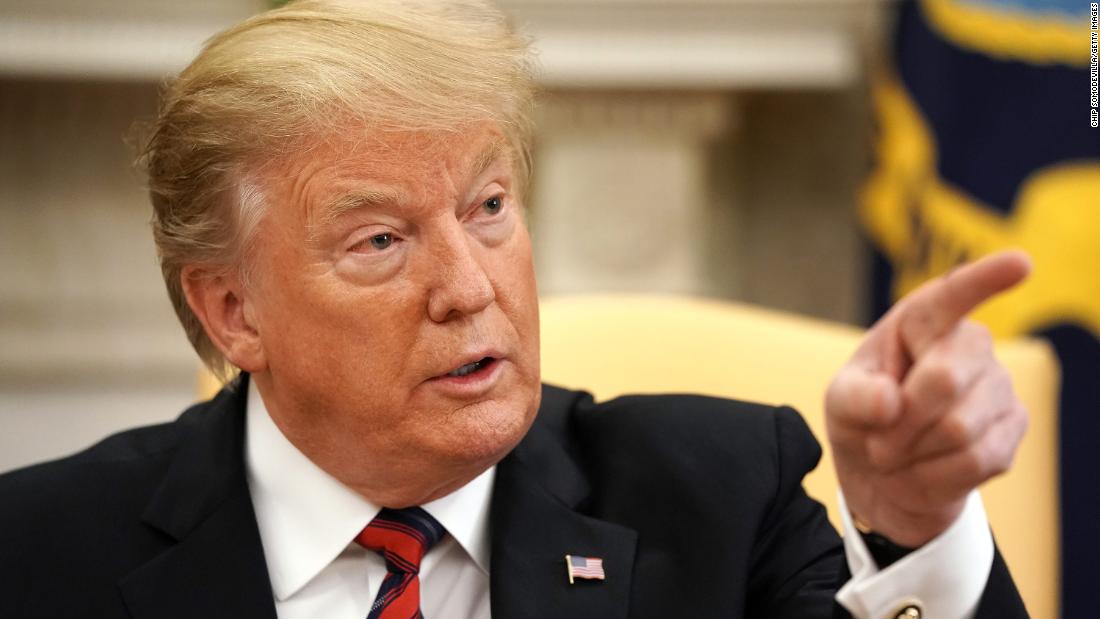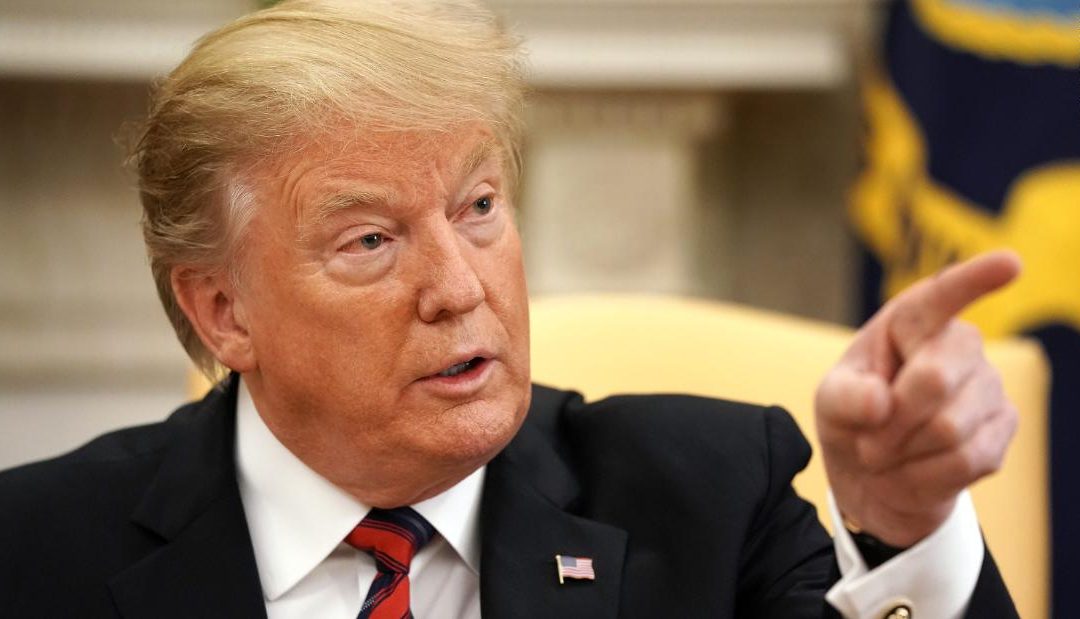
(CNN)Our system of checks and balances is out of balance. Over the past several months, President Donald Trump and the White House have taken a blunt — but thus far effective — tack in response to efforts by Congress to exercise its core constitutional oversight authority: You’ll get nothing, and you’ll like it.
Members of Congress have expressed frustration with the executive branch’s stonewalling. But, until now, they have taken little action and achieved no measurable results in their efforts to obtain crucial information on important issues, including the findings of Special Counsel Robert Mueller.
Now Trump has raised the ante by asserting executive privilege over the entire unredacted Mueller report, trying to keep private the materials that Democrats have subpoenaed. This comes as the House Judiciary Committee is scheduled to proceed with a vote to hold Attorney General William Barr in contempt on Wednesday for refusing to comply with the committee’s subpoena.
With Wednesday’s vote, Congress has begun to fight back and stand up for itself.
This vote matters on two levels. First, a contempt holding against the Attorney General is (or should be) an important symbolic statement. The Attorney General is responsible for enforcing the nation’s laws, yet Congress is asserting that Barr defied his lawful exercise of oversight authority.
Then again, congressional contempt isn’t the scarlet letter it used to be. During the previous administration, Congress held then-Attorney General Eric Holder in contempt, so now we will have seen Attorneys General held in contempt two administrations in a row. Contempt has begun to feel like an empty formality.
Second, today’s contempt vote signals the end of months’ worth of legal and political posturing. The real fight begins now.
Congress has three primary means to enforce its will, all imperfect. First, Congress has its own enforcement capacity, including a sergeant at arms and an almost-quaint on-premises jail cell that has not been used in many decades. (Speaker Nancy Pelosi noted jokingly but pointedly that, “We do have a little jail in the basement of the Capitol. But if we were arresting all the people in the administration, we would have overcrowded jail situation, and I’m not for that.”)
Second, Congress can refer a matter for criminal contempt proceedings. The problem is that referral would go to the Justice Department, headed by Barr himself — so don’t count on the Justice Department jumping into action.
Third, Congress can take the issue to court, which appears to be the next step here. But civil court proceedings typically take months, if not years. (Congress should consider requesting that one judge be appointed a special master to handle the expected glut of legal disputes between Congress and the executive branch in expedited fashion.)
Until now, Congress and the White House have been circling one another menacingly. With today’s contempt vote, the bell has rung. The real fight is about to begin, and the stakes couldn’t be higher.
Now, your questions.
Solomon, Alabama: How can Trump prevent Don McGahn, former White House counsel, from testifying before Congress in response to a subpoena?
House Judiciary Chair Jerrold Nadler has subpoenaed McGahn for documents, likely as a prelude to a subpoena for live testimony in Congress. The stakes are high, as McGahn gave Mueller powerful firsthand evidence about Trump’s potentially obstructive acts.
Although McGahn no longer works for the White House and is a private citizen, the White House “directed that he not produce” the subpoenaed documents. Trump is trying to prevent McGahn’s testimony by invoking executive privilege — the notion that conversations between Trump and McGahn while he was White House counsel are privileged, and McGahn cannot testify about those conversations without Trump’s approval.
Barr pointedly reserved the President’s right to invoke executive privilege — perhaps inadvertently slipping and saying “we” haven’t waived the privilege — in response to a question about McGahn testifying in Congress. The next day, Trump told Fox News, “I don’t think I can let him [McGahn]” testify.
Trump’s executive privilege argument is likely to fail on three levels. First, Trump already has waived it by allowing McGahn to speak with Mueller in the first place. In most circumstances, once a privilege has been waived, the privilege is gone and cannot be reclaimed.
Second, privileges are not absolute, and one exception is known as “crime-fraud.” Conversations are not privileged if made in furtherance of a crime — here, arguably, Trump’s efforts to obstruct justice by telling McGahn to have Mueller fired and then telling McGahn to lie about it.
Third, in the 1974 decision U.S. v. Richard Nixon, the Supreme Court unanimously held that executive privilege protects national security and military secrets but is not a general shield against potential criminal liability.
Trump’s team will fight like mad — clearly, they fear McGahn’s testimony — but do not expect them to succeed in the effort to silence McGahn. The problem for Democrats is that the court fight could take months, or years, to play out.
Carmela, Arizona: Can Barr be indicted or impeached for lying to Congress when he said he did not know if Mueller agreed with his summary of the report?
It is a federal crime to lie to Congress — just ask former Trump attorney Michael Cohen — and it requires Simone Biles-level gymnastics to spin Barr’s testimony as anything other than a lie. During Barr’s April 10 Senate testimony, Sen. Chris Van Hollen asked, “Did Bob Mueller support your conclusion?” Barr responded, “I don’t know whether Bob Mueller supported my conclusion.” Turns out that before Barr gave that testimony, he had received a letter from Mueller stating that Barr’s March 24 summary letter “did not fully capture the context, nature and substance” of Mueller’s “work and conclusions.”
When confronted last week with his own prior testimony, Barr tap danced, claiming he didn’t think Mueller found his letter “misleading” — which is squarely contradicted by Mueller’s actual letter.
While Barr seemingly lied in the everyday sense of the term, it’s more complicated to prove he committed perjury under federal criminal law. Barr’s explanation for his testimony relies on hair splitting and is not particularly convincing. But it could muddy the waters enough to prevent a perjury charge, which requires a precise showing of falsity. And there’s a practical problem, too: The only entity capable of charging Barr for lying to Congress is the Justice Department, which is headed by Barr himself.
Even if Barr does not get indicted, Congress has the authority to impeach an Attorney General, and several members have called for Barr’s impeachment or resignation. As a practical matter, it is exceedingly unlikely that impeachment, even if pursued, will result in Barr’s removal from office. After all, Republicans control the Senate, which can convict on impeachment only with a two-thirds vote.
Impeachment or not, Barr has done incalculable damage to his own credibility.
Sean, New Mexico: If Barr decides not to release the full Mueller report and a subpoena is unsuccessful, is there anything preventing the next Attorney General from releasing the full report?
No. Rep. Jerrold Nadler has set a Wednesday deadline for Barr to produce the unredacted report to Congress. Even if Barr misses that deadline, and even if Nadler’s subsequent efforts to obtain the unredacted report — potentially holding Barr in contempt of Congress and then bringing a civil suit to compel production — do not succeed, there is nothing to prevent the next Attorney General from releasing the full report.
That said, a successor might feel bound to keep in place certain categories of redactions including, for example, classified materials or materials that might unduly harm the reputational interests of peripheral players. But as time passes, the need for redactions will subside. For example, Barr has redacted materials that might impact pending criminal investigations; as those investigations end, the need for secrecy dissipates.
Harry, Montreal: If Trump fears being prosecuted after he leaves office, what prevents him on his last day in office from pardoning himself for all crimes or resigning and having the Vice President pardon him for all crimes?
In the report, Mueller conspicuously notes that while the Justice Department prevents indicting a sitting president, “a criminal investigation during the President’s term is permissible” and “a President does not have immunity after he leaves office.”
Trump has announced that “I have the absolute right to pardon myself.” We do not know whether a self-pardon would withstand legal scrutiny in the courts because, of course, it has never happened. The President likely would argue that the pardon power, as stated in the Constitution, is unlimited: The President “shall have power to grant reprieves and pardons for offenses against the United States.” Nothing in that text prohibits a self-pardon. An opponent would counter that a self-pardon contravenes the most fundamental tenet of our legal system: that no person is above the law.
Legally, there is nothing to prevent a president from resigning on his last day in office and receiving a pardon from a vice president who ascends (barring some illicit arrangement, such as bribery). But such a move is exceedingly unlikely because of the political and historical stain it would leave on the legacy of both individuals.
William, Wisconsin: It is commonly stated that ignorance of the law is no defense. Donald Trump Jr. has not been charged over the Trump Tower meeting, in part because he didn’t realize this was potentially illegal. Can you explain this?
Mueller analyzes Donald Trump Jr.’s liability for the June 2016 Trump Tower meeting as a potential violation of criminal law barring solicitation or receipt of campaign contributions from foreign nationals. Before the meeting, Russian nationals had offered dirt on Hillary Clinton, prompting Trump Jr.’s response, “If it’s what you say, I love it.” (It also would be a crime if Trump Jr. had conspired — agreed — with others, including Jared Kushner and Paul Manafort, to seek foreign election aid. Neither Kushner nor Manafort obtained such aid.)
Weighing against such a case is that when the meeting happened, the promised “dirt” on Clinton wasn’t provided. Generally, ignorance of the law is no defense to a crime. However, prosecutors must show that a defendant acted with requisite criminal intent, which varies depending on the crime. Campaign finance violations are unusual, requiring a “willful” act. As Mueller explains in the report, citing case law: “A willful violation will require some ‘proof of the defendant’s knowledge of the law.’ ”
The prosecutor need not show that the defendant was expert in campaign finance law or knew every nuance. Rather, the prosecutor must show that the defendant “had general knowledge that his conduct was unlawful.” Mueller concludes that “the government would unlikely be able to prove beyond a reasonable doubt that the June 9 meeting participants had general knowledge that their conduct was unlawful.”
Based on the facts discovered by Mueller, I disagree with this legal conclusion. Trump Jr. was centrally involved in his father’s campaign and must have known something at least generally about campaign finance. And Trump Jr. tried to mislead the public about the meeting afterward, which shows his guilty knowledge. If he had no idea he may have broken the law, why did he hide the true purpose of the meeting? Ultimately, however, Mueller concluded otherwise, and his inability to prove Trump Jr.’s general knowledge of campaign finance laws was a primary factor counseling against indictment.
Three questions to watch this week:
Sign up for our new newsletter.
1. Will the House and Robert Mueller agree to a date and terms under which Mueller will testify, despite the President’s objection?
2. Now that Treasury Secretary Steve Mnuchin has refused the House’s request for Trump’s tax returns, will the House hold Mnuchin in contempt and bring a legal challenge to court?
3. Will the House seek to compel testimony from Barr after he skipped out on the originally scheduled date, purportedly because he did not want to face questioning from staff attorneys?







Recent Comments